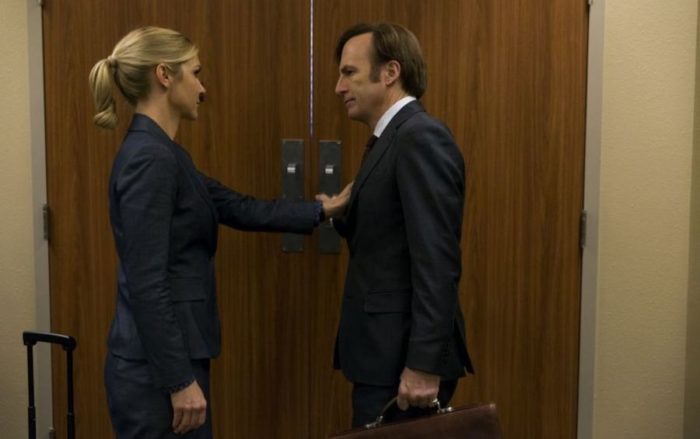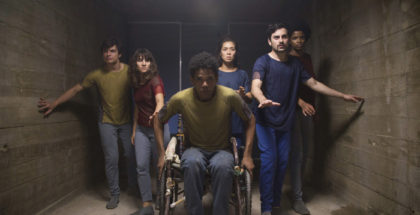Netflix UK TV review: Better Call Saul Season 3, Episode 5 (Chicanery)
Review Overview
Cast
9Courtroom
9Chicanery
9David Farnor | On 10, May 2017
Warning: This contains spoilers. Not seen Better Call Saul Season 3? Catch up with our spoiler-free review of Episode 1 here.
For a show that’s all about lawyers, Better Call Saul has a surprisingly little amount of lawyering going on. It’s no coincidence, perhaps, that some of the best episodes in the show’s three seasons have been episodes that feature Jimmy (Bob Odenkirk) or Kim (Rhea Seehorn) at work. Episode 5 of Better Call Saul’s superlative third season takes place almost entirely in a courtroom. It’s also one of the series’ best episodes yet.
The hearing, of course, is all part of Chuck’s plan to take Jimmy down. After exploiting his intimate knowledge of his brother to bring about his destruction – by hiding that cassette tape and playing on his sympathies, by getting Howard and a private detective to wait for Jimmy for come and snatch the tape – he’s engineered a cruel rock and a hard place for Jimmy squeeze between. On the one side, criminal conviction. On the other, disbarment from the law, permanently. But the end of last episode, as Jimmy and Kim walked out of the courthouse with a spring in their step, like a freeze frame at the epilogue of an old superhero movie, told us not to expect a simple victory for Chuck – and, sure enough, what we witness here is a painstaking, brutal, gripping act of rewriting a pre-ordained narrative.
Things start the way Chuck intends, as his team play the cassette tape – which Kim was so careful to make sure was mentioned in their original agreement last episode – and we hear, once more, that fateful conservation between brothers, as Chuck laid on his illness and Jimmy confessed to sabotaging the Mesa Verde files to lose HHM the contract. Changing the context of that conversation is a simple, but colossal move from writer Gordon Smith, which forces the brotherly dispute out of the complex world of emotions and into the supposedly less complex realm of the law: a system designed to sort right from wrong.
The thing is that we know both antagonists are right and wrong, each of them acting out of a scorned resentment and a sense of righteous superiority. Jimmy, who’s worked his butt off to become a lawyer and repeatedly sacrificed himself to support his brother, has just been betrayed by the person he looked up to and cared about. Chuck, who resents his brother for being their mother’s final words, who can’t stand the idea that Jimmy might be on the same footing as him, is determined to do anything to get back at his younger sibling. One breaks the rules with good intentions. One exploits the rules with cruel motives. Jimmy’s sabotaging of Mesa Verde wasn’t even to spite Chuck: it was to do something nice for Kim.
“He has a way of doing the worst things for reasons that seem almost noble,” sums up Chuck, when he’s in the witness stand, and it’s an observation borne out of affection and frustration, as well as deeply buried anger. And Jimmy spends 20 minutes slowly digging it up.
Michael McKean is on award-worthy form here, a studiously composed picture of smug correctness. But he’s head-to-head with Bob Odenkirk – and if there’s one thing that Odenkirk is good at, it’s putting on a show. Watching Jimmy in full, razzle-dazzle flow is quietly remarkable, as he gradually wins over the panel of stern judges – who have been wooed by Chuck in previous weeks – not entirely, but just enough to earn himself a bit of elbow room. That lee-way is all he needs to start questioning Chuck about his condition – one that Chuck insists is medical and Jimmy, well, isn’t so sure. After all, Chuck was able to lie and manipulate his way into Jimmy’s sympathies by exaggerating his symptoms – a surefire way to lose anyone’s trust.
While Jimmy begins his cross-examination of Chuck, needling him into small outbursts of annoyance, he’s silently assembling the audience for his show: in the back of the courtroom, he invites along Huell (Huell!), whom he finds via Mike in our prologue, and also Rebecca.
Which is the perfect time to talk about that flashback at the start of the episode. We meet Chuck’s wife for the second time before the credits, as she’s invited over to dinner at Chuck’s house – but this is several years after the last time we saw her and Chuck now has his EHS condition to deal with. Rather than tell her, he chooses to hide it – and Jimmy, like the loyal little brother he is, agrees to help him. Chuck concocts an elaborate spiel about a bill being mixed up by the electric company, while Jimmy nods and sighs along with him, after spending all day rigging the place with lamps and candles. Things are amicable enough, albeit forced, until Rebecca suddenly answers her cell phone – and Chuck, in excruciating pain, takes her phone from her and throws it away. Why? He makes up another lie about hating how rude she was to answer her phone.
McKean repeats the exact same trick in the courtroom, putting on a mask of civility that slips slowly, unexpectedly and erratically. And, when it snaps, it does so under another mask: one of anger about the importance of etiquette and doing the right thing. The straw that breaks the camel’s back is Jimmy’s own cell phone – or, more accurately, his battery. Jimmy gets out his mobile to try and demonstrate Chuck’s inconsistencies, only for Chuck to point out that it’s not really on. But that’s when Jimmy pulls the final rug out from under his brother’s feet: the reason it’s not on is because he got Huell to plant the fully-charged battery in Chuck’s inside jacket pocket.
It’s a simple gesture that raises complex questions. Director Daniel Sackheim shows us, in that flashback, the kind of pain Chuck experiences when he suffers an electricity-triggered seizure – a discomfort conveyed through flashing visuals, strobing lines and hazy close-ups. It’s enough to make us convinced that Chuck really does have a condition, yet we also know that he’s a dishonest man, and that Jimmy compromised his own integrity to enable that dishonesty. In the present day, meanwhile, we see that Chuck doesn’t suffer any symptoms at all with the battery in his jacket (there’s no visual disorientation for us either). Chuck begins to rant in exasperation, but he only appears unbalanced, even likening at one point his psychosomatic illness to AIDS, which “wasn’t identified properly until 1981”. Goodbye, sympathy.
But Jimmy, now the composed one, takes no pleasure in bringing Rebecca into the courtroom – forcing Chuck, years later, to admit what’s wrong with him to his ex-wife. Chuck jokes that Jimmy is trying to unsettle him, as they have a brief adjournment, but they both know it’s worked. And that realisation is the turning point for the excruciating 45 minutes. It really is an episode of two halves: the first, seeing Chuck’s pleasure at Jimmy’s downfall; the second, seeing Jimmy’s sadness about doing the opposite. As much as McKean is magnificent at being mean, Odenkirk’s even better at playing the tragic hero – and it’s that contrast in their performances, in the light of what we know Jimmy’s going to become, that makes this such a wonderfully well-judged moral dilemma. Chuck claims to want to uphold the meaning of the law, the importance of objective justice, but by using it to get his own petty revenge, he’s equally guilty of perverting the purpose of this hallowed institution. In the eyes of the law, there’s right and there’s wrong, but by dragging this dispute into that context, Better Call Saul is at its most riveting, as it reminds us of one ultimate leveller: that here, there can be no winner.
New episodes of Better Call Saul Season 3 arrive exclusively on Netflix UK every Tuesday. Season 1 and 2 are already available.




















